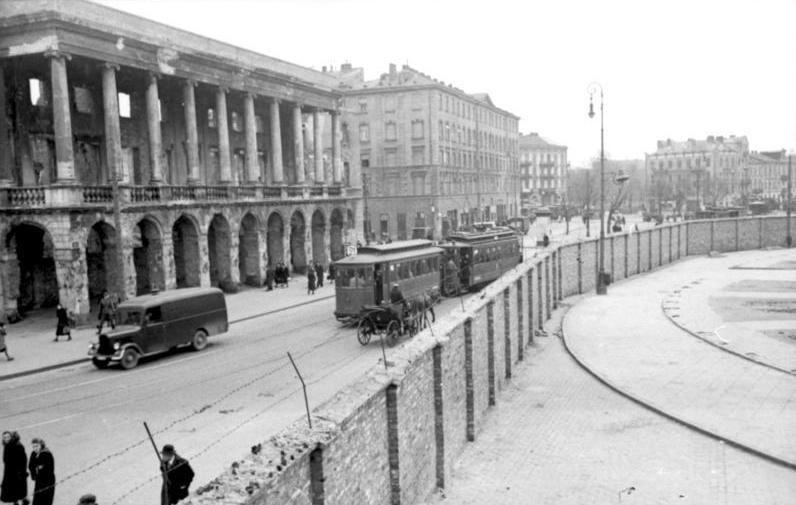Warsaw Ghetto (German: Warschauer Ghetto, officially Jdischer Wohnbezirk in Warschau, "Jewish Residential District in Warsaw"; Polish: getto warszawskie) was the largest of the Nazi ghettos during World War II. It was established in November 1940 by the German authorities within the new General Government territory of occupied Poland. At its height, as many as 460,000 Jews were imprisoned there, in an area of 3.4 km2 (1.3 sq mi), with an average of 9.2 persons per room, barely subsisting on meager food rations. From the Warsaw Ghetto, Jews were deported to Nazi concentration camps and mass-killing centers. In the summer of 1942, at least 254,000 Ghetto residents were sent to the Treblinka extermination camp during Groaktion Warschau under the guise of "resettlement in the East" over the course of the summer. The ghetto was demolished by the Germans in May 1943 after the Warsaw Ghetto Uprisings had temporarily halted the deportations. The total death toll among the prisoners of the Ghetto is estimated to be at least 300,000 killed by bullet or gas, combined with 92,000 victims of starvation and related diseases, the Warsaw Ghetto Uprising, and the casualties of the final destruction of the Ghetto.
The Holocaust, also known as the Shoah, was the genocide of European Jews during World War II. Between 1941 and 1945, Nazi Germany and its collaborators systematically murdered some six million Jews across German-occupied Europe, around two-thirds of Europe's Jewish population. The murders were carried out in pogroms and mass shootings; by a policy of extermination through labor in concentration camps; and in gas chambers and gas vans in German extermination camps, chiefly Auschwitz-Birkenau, Bełżec, Chełmno, Majdanek, Sobibór, and Treblinka in occupied Poland.Germany implemented the persecution in stages. Following Adolf Hitler's appointment as chancellor on 30 January 1933, the regime built a network of concentration camps in Germany for political opponents and those deemed "undesirable", starting with Dachau on 22 March 1933. After the passing of the Enabling Act on 24 March, which gave Hitler dictatorial plenary powers, the government began isolating Jews from civil society; this included boycotting Jewish businesses in April 1933 and enacting the Nuremberg Laws in September 1935. On 9–10 November 1938, eight months after Germany annexed Austria, Jewish businesses and other buildings were ransacked or set on fire throughout Germany and Austria on what became known as Kristallnacht (the "Night of Broken Glass"). After Germany invaded Poland in September 1939, triggering World War II, the regime set up ghettos to segregate Jews. Eventually, thousands of camps and other detention sites were established across German-occupied Europe.
The segregation of Jews in ghettos culminated in the policy of extermination the Nazis called the Final Solution to the Jewish Question, discussed by senior government officials at the Wannsee Conference in Berlin in January 1942. As German forces captured territories in the East, all anti-Jewish measures were radicalized. Under the coordination of the SS, with directions from the highest leadership of the Nazi Party, killings were committed within Germany itself, throughout occupied Europe, and within territories controlled by Germany's allies. Paramilitary death squads called Einsatzgruppen, in cooperation with the German Army and local collaborators, murdered around 1.3 million Jews in mass shootings and pogroms from the summer of 1941. By mid-1942, victims were being deported from ghettos across Europe in sealed freight trains to extermination camps where, if they survived the journey, they were gassed, worked or beaten to death, or killed by disease, starvation, cold, medical experiments, or during death marches. The killing continued until the end of World War II in Europe in May 1945.
The European Jews were targeted for extermination as part of a larger event during the Holocaust era (1933–1945), in which Germany and its collaborators persecuted and murdered millions of others, including ethnic Poles, Soviet civilians and prisoners of war, the Roma, the disabled, political and religious dissidents, and gay men.

1942Jul, 22
Holocaust: The systematic deportation of Jews from the Warsaw Ghetto begins.
Choose Another Date
Events on 1942
- 25Jan
Thailand
World War II: Thailand declares war on the United States and United Kingdom. - 8Mar
Myanmar
World War II: Imperial Japanese Army forces captured Rangoon, Burma from British. - 10Jul
Soviet Union
Diplomatic relations between the Netherlands and the Soviet Union are established. - 13Aug
Manhattan Project
Major General Eugene Reybold of the U.S. Army Corps of Engineers authorizes the construction of facilities that would house the "Development of Substitute Materials" project, better known as the Manhattan Project. - 25Sep
Holocaust
World War II: Swiss Police instruction dictates that "Under current practice ... refugees on the grounds of race alone are not political refugees", effectively denying entry to Jews trying to flee occupied Europe during the Holocaust.

 English
English  español
español  français
français  português
português  русский
русский  العربية
العربية  简体中文
简体中文 